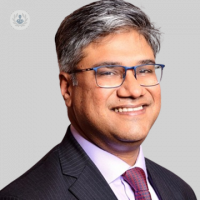An expert's insight to liver surgery
Written in association with:Renowned consultant general and hepato-pancreato-biliary surgeon Mr Deepak Hariharan provides us with an expert insight into liver surgery, including reasons for the procedure, what’s involved and recovery.
What reasons would someone require liver surgery?
The liver is the largest organ in the body and has complex functions.

To describe its function simply, we can say that it acts as a purifier and helps to maintain a state of balance in the body.
Surgery for the liver is often contemplated when part of the organ´s ability to function normally is reduced. This usually occurs as a result of tumours, which may inherently arise within the liver or be deposited from other sites in the liver.
Is it a serious operation?
Liver surgery is considered a major, complex, surgery and is undertaken in super-specialised centres of excellence. The medical personnel in these centres are highly qualified and skilled, having undertaken requisite certification with rigorous training standards, which have been applied and maintained.
The centralisation of liver surgery has led to increased safety for patients using the multi-disciplinary team approach to ensure replicable, reproducible results and sustainable clinical outcomes.
What's involved in liver surgery?
Liver surgery is recommended after stringent clinical scrutiny. Case selection is paramount to the presentation of evidence, general health and the fitness of the patient. This includes:
- Performance status.
- A detailed appreciation of nature.
- Biology.
- Number and location of the tumour.
- Prognosis.
- Tailoring surgical intervention and assessing risk/ benefits of surgical intervention.
The surgical team is supported in the preoperative phase by dedicated medical preassessment teams, who aid categorisation, optimisation and reduction of surgical risk.
The anaesthetic team and intensive care team work to support intra-operative and post-operative care to ultimately restore function.
What happens immediately after surgery and how long does it take to recover from it?
After surgery, the tube and machines used to support breathing and circulation are removed in a safe environment.
Following this, the patient is transferred to the intensive care unit, where they are intensely monitored for 36-48 hours. This is done in order to look for any immediate complications post liver surgery, which may include:
- Bleeding.
- Bile leakage.
- Liver failure.
- Cardiac or respiratory deterioration.
As soon as any potential complications have been ruled out, the patient is encouraged to eat, drink and mobilise.
All the tubes/lines used for monitoring purposes are removed and the patient willl be moved to a general surgical ward. On the ward, they are encouraged and supported to resume their day-to-day activities, with a view to be discharged within 3-7 days of surgery However, the discharge time ultimately depends on the kind of surgical intervention, progress and pre-existing health of the patient.
What's the survival rate of liver surgery?
The survival rates following liver surgery are extremely positive. Survival is determined based on the nature of the primary liver problem, general physical health of the patient, ability to tolerate surgical treatment and avoid complications.
Following this, if necessary, they will have to respond to additional treatments such as chemotherapy. The most common reason for liver surgery is secondary deposits in the liver or metastases from colon or rectal cancer. In select cases, the five-year overall survival rates post-liver surgery exceed 60%.
If you would like to book a consultation with Mr Hariharan, do not hesitate to do so by visiting his Top Doctors profile today.


